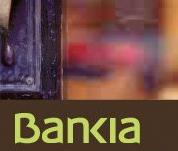Moody’s Downgrades Spanish Banks
Bankia logo
President Obama is hosting two big summits this weekend. There’s the NATO summit in Chicago, but first he welcomes the leaders of the “Group of 8″³ biggest industrialized nations to Camp David.
Europe’s economic crisis in Europe is likely to be front and center at the G8, especially fears that Greece may be on the verge of pulling out of the eurozone.
Perhaps no one is watching Greece with as much worry as the Spanish.
Spain’s economy is in big trouble, with 25 percent unemployment and a crippled banking sector. Spain’s worry is that if Athens leaves the eurozone, investors could lose faith in Madrid as well, and put their money elsewhere.
Spain’s stock market plummeted this week as its major banks got bailed out again, and downgraded by a ratings agency.
One bank in particular is at the heart of the storm – Bankia. It’s a merger of five smaller banks. Bankia, which went public last year, was meant to symbolize a reinvigorated banking sector. This week, the government had to come to its rescue with $10 billion.
The bailout, plus a rumor of a run on the bank, sent Bankia’s stock price plunging. Spain’s Secretary of State for the Economy Cristobal Montoro went on TV this week to urge Spaniards not to panic. He said Bankia was solvent, as was the entire banking sector.
“Spanish banks are not going to suddenly freeze people’s accounts,” Montoro said. “The banks are not going to withhold your savings.”
But Montoro’s assurances didn’t stop one woman from confronting him Friday, outside his office in Madrid. The exchange was caught on TV. Bankia isn’t going under, is it? the distraught woman asked. No need to worry, Montoro said.
The woman shot back that if the bank goes down with her money, she’ll kill someone.
Spanish banks have been in trouble for more than three years now. They were caught in a spectacular housing crash that’s left them with tens of billions of dollars in bad loans and defaults.
Spanish Prime Minister Mariano Rajoy announced this week a fourth bank bail-out, worth some $30 billion. But at least one ratings agency, Moody’s, sees the move as insufficient. On Friday, it downgraded 16 Spanish banks.
On the eve of the G8 Summit, Prime Minister Rajoy said Spain has done all that it can to help its banks, and he demanded the European Union be ready to help, if needed.
“The situation is very difficult and complicated,” he told reporters. “Our borrowing rates are soaring and that means it is becoming very hard to finance the government.”
By EU, Rajoy was referring to Germany, by far the biggest payer into the European Central Bank. But German Chancellor Angela Merkel hasn’t signaled any change in her position, that budget cuts, not bail-outs, are the way to heal Europe’s weak economies.
Meanwhile, Spaniards are getting nervous with the seemingly endless bad economic news — nervous and disillusioned, says Gayle Allard, an economist at the IE Business school in Madrid.
“When they came into the euro, the Spaniards were so proud to make it in, and I think it was like, okay, we’ve arrived,” Allard said. “Now we’re here and this is the rest of our lives. There was never any questioning that this a good thing for Spain, and that it was a permanent thing for Spain. And to shake that up it just puts cracks in the project, that I don’t know how you’d repair them.”
Cracks in the faith of investors who lend Spain money, but also among Spaniards themselves, according to economist Pablo Triana. He says a Greek exit from the euro might tip the balance here.
“I think there is lot of people in Spain, if Greece were to exit, they would be emboldened to demand similar action,” Triana said.
In other words, voters in Spain might follow Greece’s lead, electing leaders willing to oppose austerity measures, even if that means a return to the peseta — or people might make a real run on their banks.
Shares in Bankia, by the way, rebounded Friday, after rumors of a run on it were dispelled. But the plunge was an indication of how jittery investors are.
In the U.S., officials and some economists have been urging Europe to spend its way out of the crisis – stimulate the economy, rather than strangle it, goes the thinking. Because you can only pay debt off if your economy is growing.
That’s likely to be part of the message President Obama gives to visiting European heads of state at the Camp David summit this weekend.
